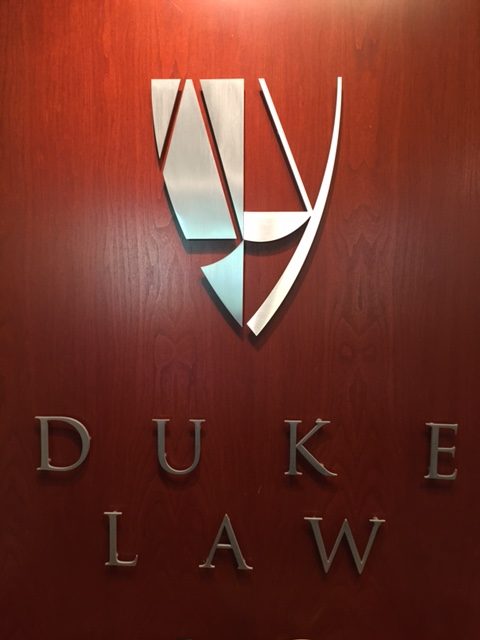eDiscovery Daily Blog
Reporting From the EDRM-Duke Law 2017 Spring Workshop: eDiscovery Best Practices
This blog post is a little longer than most as there is a lot to cover here…
This week, EDRM held its first Spring Workshop since it was acquired by Duke Law last August, which means this was the first workshop held at the Duke campus in Durham, North Carolina and it was unique in several ways. Here are a few of highlights from the workshop.
Location
As I mentioned, the Workshop was held on the Duke campus in Duke Law School (conveniently and, by design, the school year has just ended). The venue was excellent and the Duke campus is beautiful, with the law school about a mile from the hotel where many of the participants stayed. Here’s a couple of examples.
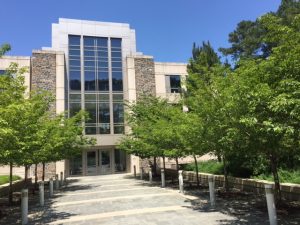
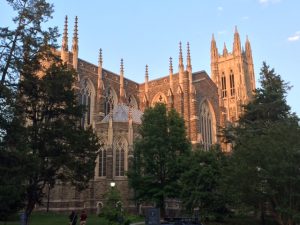
Even the parking garages are architecturally impressive!
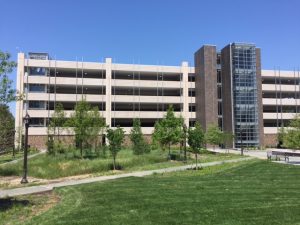
Attendees
There were about 50 participants at the workshop, and most of them (at least by my observation) were either law firm or service provider participants. While there were a few familiar faces (I’ve been attending EDRM meetings since the second year in 2006), most of the people that I met and spoke with were first time attendees to an EDRM workshop. I’m not sure if the reason for that was the change in locale, the primary project below being worked on (below), or both. Regardless, it appears that a number of new people are interested in participating in EDRM, which is a clear indication that the importance of EDRM has remain unchanged after the acquisition by Duke.
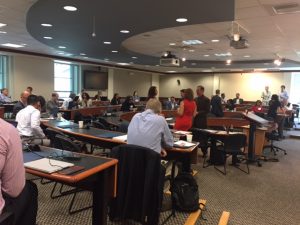
Project Activities
The majority of attendees were participating in one primary project identified by EDRM as its top goal for the year: developing a user guide for Technology Assisted Review (TAR), with one team working on Cross Border Discovery. After some initial introduction activities at the start of the workshop by John Rabiej (Director of Duke Law School Center for Judicial Studies), George Socha (founder of EDRM) and Jim Waldron (the new EDRM director) , the teams split into breakout groups to work in their specific teams on Tuesday, with follow-up breakout sessions completed yesterday.
Technology Assisted Review
The TAR effort was broken into three teams, working on various aspects of TAR, as follows:
Team 1: Led by Mike Quartararo of Stroock & Stroock & Lavan LLP, this team was formed to define TAR (and the types of TAR) and discuss use cases for TAR.
Team 2: Led by Adam Strayer of BDO Consulting, this team was formed to discuss factors to consider when deciding whether to use TAR, as well as factors to consider when selecting a TAR tool and service provider. I am participating on this team.
Team 3: Led by Gareth Evans of Gibson Dunn, this team was formed to discuss “transparency” and “cooperation” considerations regarding TAR, as well as designing and implementing a sound TAR protocol and workflow.
In much the same way that Max McGee said “Coach, you’re going too fast” when Vince Lombardi started a training camp by telling his Green Bay Packer team that “This is a football”, Team 1 spent a lot of their time on Tuesday debating the definition of TAR and/or the appropriate scope of the user guide. Since teams 2 and 3 were impacted by that discussion as well, the entire group re-convened yesterday morning to discuss the issue further. The basic discussion came down to two issues:
- Whether the definition of TAR (and scope of the document) should be limited to supervised machine learning technology (commonly today called predictive coding) or should include unsupervised machine learning technologies (such as clustering and email threading), and
- Whether we should even call the process Technology Assisted Review, or use more specific terms (supervised/unsupervised machine learning), while referencing the more commonly used terms of TAR and predictive coding for continuity and familiarity.
As you can imagine, it was a spirited discussion with attendees having different viewpoints on the topic. :o) Aspects of the decisions are still being finalized, so I won’t jump the gun here (sorry, you’ll have to wait for the publication!).
The TAR team is TARgeting (no pun intended) an initial version of the guide for The Duke Conference on Technology Assisted Review (TAR) Best Practices in September 7th and 8th in Arlington, Virginia.
Cross-Border Discovery
A small team, led by Deena Coffman of BDO Consulting, began work on a cross border discovery project, with an initial primary focus on the General Data Protection Regulation (GDPR) regulation that enters into application on May 25, 2018. Initial discussions focused on identifying manageable first steps that could serve as a building block and the group drafted initial language to formalize a proposed initial scope to be submitted soon to EDRM members with the process to be iterative to eventually (hopefully) lead to a Code of Conduct. Deena also indicated that the group will also reach out to EDRM members for real life lessons and lessons learned in cross-border discovery.
Networking
Of course, one of the best benefits of attending an EDRM workshop is the opportunity to network with colleagues that also work in eDiscovery and share ideas, and this workshop was no exception. At breakfasts, lunches, dinner, happy hour and within sessions, all of us were able to discuss a variety of topics (most work related, some not) with various attendees and learn how they address eDiscovery challenges in their organizations. Speaking personally, this was the most enjoyable EDRM workshop I’ve attended in some time and I enjoyed seeing a lot of new faces at this year’s workshop getting involved in thought leadership in our industry. That’s what EDRM is all about.
If you’re interested becoming a member of EDRM and participating in any EDRM project, click here for more information, including fee information and a link to a registration form.
So, what do you think? Are you a member of EDRM? Are you interested in becoming a member? Please share any comments you might have or if you’d like to know more about a particular topic.
Disclaimer: The views represented herein are exclusively the views of the author, and do not necessarily represent the views held by CloudNine. eDiscovery Daily is made available by CloudNine solely for educational purposes to provide general information about general eDiscovery principles and not to provide specific legal advice applicable to any particular circumstance. eDiscovery Daily should not be used as a substitute for competent legal advice from a lawyer you have retained and who has agreed to represent you.

